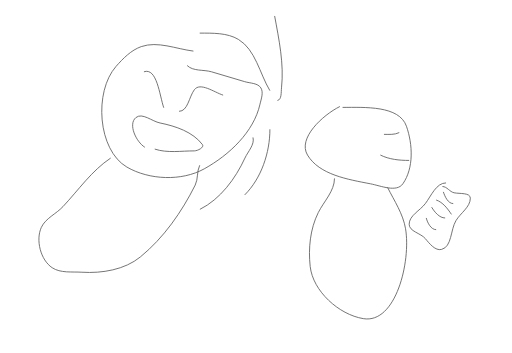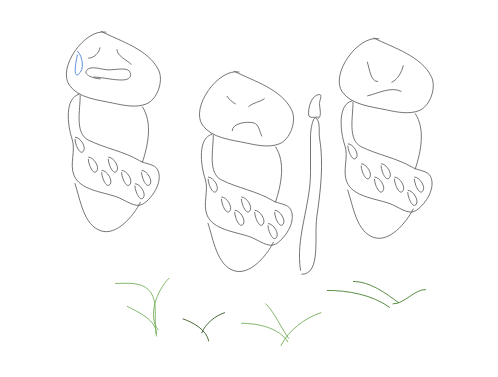A couple of months ago, I thought it would be fun to set a challenge for myself: write a page a day on something, literally anything.
It ended up giving me some forced reflection time where I could materialise my thoughts down on paper. After a couple days, I started thinking about emotion and how it drives people to do strange things.
From there, I went down a rabbit hole of questioning why we have emotion in the first place, and how we could control our emotions without external factors.
Envy
Envy is the state of toxic desire. Desire can be broken down as the absence of fulfilment in a goal, and the state of craving that results.

When you envy a state of being, your brain is trying to telling you that the goal is achievable, but that you’re not fulfilling it.
You don't envy things that our out of your reach. No one envies superman, because we realise it's impossible to shoot lasers our of your eyes. We (especially children) admire his courage and honesty, values that we can practice too.
People talk about envy as “poison” because it stays with you until you either
- Achieve that goal
- Move onto a different goal
You become stuck with this toxic feeling of dread and jealousy until you achieve your goal. Once that goal is achieved, your mind restructures itself to desire something that is even harder to achieve, always pushing your to your limits. Elon Musk went from
The other option is to change your goals. But goals are mostly subconscious and can't be changed on command. Once you do change them, you're still stuck in a state of envy.
The solution lies in expectation.
Expectation vs reality
Humans need goals to function. Without direction, we wouldn't have incentive to move or to perform any basic function.
These goals are deeply ingrained in our brains, and are often understood after we act. We can figure out why we're doing things on a surface level, but if I keep asking you why? why? why? it'll reach a point where you no longer understand why you exist.
Expectation — what you think will happen.
Reality — what actually happens.
Every second, we’re making millions, if not billions of assumptions (actually, I'm not sure you could put a count on the number of assumptions you make. Space is theoretically infinite, and assumptions rely on spaciality, so it could be infinite. But how can a confined brain make an infinite amount of assumptions?). For example, when I’m writing this article, I need to assume that my heart will keep pumping 24/7, that my eyes will blink, that my head won’t explode, and that some guy won’t break into my house and tackle me.

Assumption leads to the expectation of some outcome, where as reality might not actually align with that expectation. Since assumption relies on experience, when assumptions are wrong, it's because we don't have enough experience to make a proper assumption.
It doesn't help that humans don't think statistically. When thinking about dying next year for ex, we either think that we're going to die, that we're not going to die, or we're unsure. We don't think in probabilities, only in binary.
As a result, we're often wrong and suffer the emotional consequence.
Betrayal — the worst of all pains — comes when that expectation is broken. The pain and sadness you feel is your body telling you “that false reality you’ve been living in, yeah not the best idea to keep living like that”, so you adjust your view of the world to fit whatever data point you’ve just learnt.
It makes sense that we often feel sad and betrayed. We subconsciously rely on what we know, and that’s not much considering how vast human knowledge is.
Why lying is bad
Why do we feel guilty about lying?
Because just like expectation, you’re fabricating a false environment around you — and there’s nothing life hates more than false realities.
When I say I did my homework when I really didn’t, I’m actually creating a false expectation of reality in my teacher’s mind that I’m a good student, when really I’m not.
Knowing the absolute truth lets us make better decisions. Not knowing the truth skews our decision making and can actually make us less likely to survive in the long run.
Ex: I'm a homo sapien living in the year 50 000 BC. If I tried to gain admiration and credibility by telling my tribe that there was this place I found that had a bunch of good food, people would respect and follow me. But once they get all the way out and realise there isn’t actually any food, we end up wasting a bunch of time and resources and now we might all die because of it.

That uncomfortable gut feeling you feel when you lie is probably something we developed to stop us from skewing reality and risk harming the entire community.
Validation
Validation is truth without facts. You feel like your belief is right because other people say so, but that doesn’t hold up to objective reality.
You’ve only lived 0.0001% of all human experience. If someone else validates your beliefs, that still only 0.0002% of all experience.
Validation gives us way more confidence because it was an extremely useful in hunter-gatherer tribes. Validation is synonymous with cooperation, which would have lead to growth and perpetuation of the species.
But, validation puts you in the same spot as the liar. You’ve created a false reality around yourself that’s fundamentally rooted in experience, not fact. So again, we become prone to betrayal and suffering.
Humility and Entitlement
Humility — low expectation.
Entitlement — high expectation.
Since we’re goal oriented, it’s hard to feel humble, because it implies a satisfaction with the current state and a low expectation for future states.
We’re wired to self improve and propagate the human species. But not only that, we’re wired to increase human potential.
Tons of sex is only valuable if humans know how to collaborate. Polygamy is only valuable if humans can still learn and self improve — which is hard when you have one parent. We need to act in a way that guarantees survival and propagation in the present, but also maximises our potential for the future.
It could be that our brain doesn’t let us feel humble and devoid of all expectation. But by reducing that expectation, you can reduce suffering.
Buddhism
Buddha believed that there were 3 universal truths:
1. The Nature of suffering
Suffering is universal and dissatisfaction is the default human state.
2. Desire is the cause of suffering
Our pain is caused by our goal oriented nature, and constant striving to fulfil our desires.
3. Suffering can be limited by minimising desire
Removing yourself from desire will limit your negative emotional response from not fulfilling those desires.
The three universal truths can be summed up as:
"Things don’t happen to you, they just are."
Most of his philosophy ties into what I said before about expectation and reality. When we willingly put ourselves in a state of desire, we rely on expectation an hence feel dissatisfaction.
The fulfilling of that desire is the expected outcome. When we don’t achieve it, we become sad — a sign that we aren’t well conditioned to reality, and that our expectations based off previous experiences were actually wrong.
It comes down to understanding your goals and the expectations you’re tying to them. Embrace humility and lower expectation.